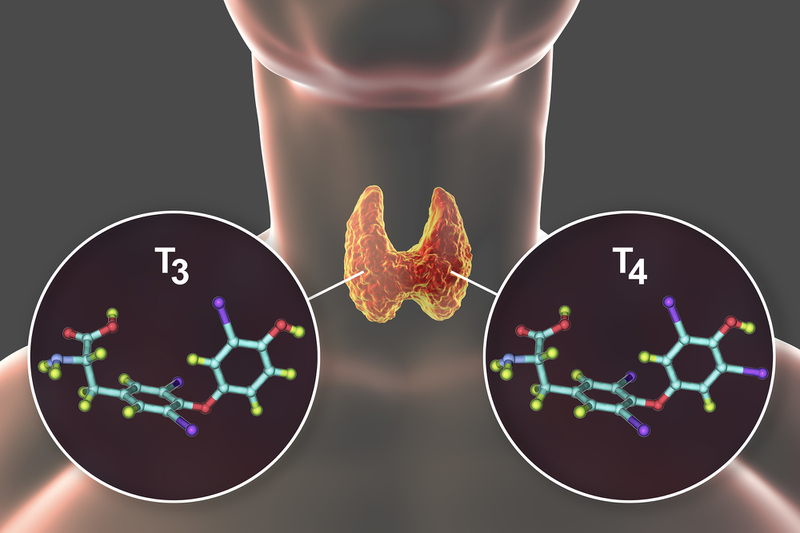The thyroid is one of the organs of the endocrine system that plays a very important role. This is an endocrine gland located in the neck, consisting of two lobes connected to each other. The lower two-thirds of the lobe is connected by a thin strip of tissue called the thyroid isthmus. The thyroid gland is located in the front of the neck, just below the “Adam’s apple”.
What is TH?
Before learning about the effects of the thyroid gland secreting too much TH, we first need to understand what TH is? TH stands for Thyroid hormone (Thyroid hormone). These are important hormones produced by the thyroid gland, an organ located in the front of the neck. As mentioned above, this organ is responsible for creating two main hormones, triiodothyronine (T3) and thyroxine (T4), which exist in the thyroid follicles.

TH is the English abbreviation for Thyroid hormone.
Although T3 is known to be the more potent hormone, T4 accounts for 90% of the total thyroid hormone. Both hormones are transported in the body via plasma, partly bound to protein and partly in free form. Once in the tissues where they are needed, T4 is converted to T3, the main active form of thyroid hormone.
Thyroid hormone production is controlled by the pituitary gland, an organ in the brain, through thyroid-stimulating hormone (TSH). When the pituitary gland senses that the amount of thyroid hormone in the body is low, it increases the secretion of TSH to stimulate the thyroid gland to produce more hormones. Conversely, when the thyroid hormone level reaches the required threshold, the pituitary gland reduces the production of TSH to maintain balance and control this process.
What are the effects of too much TH secretion by the thyroid gland?
When the thyroid gland secretes too much TH, it can lead to hyperthyroidism, causing a series of effects on the body. Hyperthyroidism occurs when the thyroid gland produces and secretes more thyroid hormones (T3, T4) than the body needs. This can cause many unwanted symptoms, negatively affecting the patient’s health and daily activities.
Increased metabolism when the thyroid gland secretes too much
TH Thyroid hormones (T3 and T4) play an important role in regulating energy metabolism in the body. When thyroid hormone levels increase, metabolism also increases, leading to increased energy consumption and fat burning.

The thyroid gland secretes too much TH, which promotes increased energy consumption and fat burning.
Thyroid gland secretes too much TH, increasing metabolism
A clear manifestation of an overactive thyroid is increased metabolism and increased body temperature. The patient may feel afraid of heat, the skin becomes hot, sweats more and even feels a slight fever.
Abnormal psychology
Anxiety, mood swings, restlessness, and difficulty sleeping are common symptoms when the thyroid gland secretes too much TH. Sometimes, psychological changes can be more serious, including agitation, confusion or paranoia.
Affects muscles and bones
Hyperthyroidism not only affects the mind but also spreads to the muscles and bones. Symptoms include trembling in the fingertips, thin skin, brittle hair, muscle weakness, causing unwanted changes in the arms and thighs.
Diarrhea
The digestive system is also affected to some extent if the thyroid gland secretes too much TH, with diarrhea without cramps being one of the common manifestations.

Diarrhea can be a sign of too much thyroid hormone.
Hormones secreted by the thyroid gland
In a normal functioning body, the thyroid gland produces hormones including thyroxine, triiodothyronine and calcitonin. In which, thyroxine and triiodothyronine play a very important role in the development of the body and the process of energy metabolism. Calcitonin (thyrocalcitonin) is a hormone that regulates calcium and phosphorus metabolism.
Functions of thyroid hormones:
- Affects the activity of the gonads and mammary glands.
- Helps increase blood flow through the heart, increase heart rate, increase respiration to provide oxygen for the metabolism in organ tissues.
- Increases cell activity, enhances glucid and lipid metabolism to create energy for the body, helping to lose weight effectively.
- Increases the activity of the brain as well as the nervous system.
- Promotes growth and development in the body.
- Ensures a stable density of calcium in the blood.
Thyroid hormone synthesis and secretion
The synthesis and secretion of thyroid hormones is extremely complex and is especially important in maintaining metabolic balance and body function. The thyroid gland and the hormones T3 and T4 play a major role in regulating energy, temperature and growth of the body.
The synthesis of hormones begins when iodine from food is converted and absorbed into the thyroid gland through the mechanism of the iodine pump. In the thyroid colloid, iodine is oxidized and combined to form MIT and DIT molecules. From the combination of these two molecules, two main forms of thyroid hormones, T3 and T4, are formed.
T3 and T4 hormones are then released into the blood and exist in two forms: One form bound to plasma proteins, mainly TBG, and one free form (Free T3 and Free T4). Although the free form accounts for a small portion, it has a great influence on the biological function of thyroid hormones.

When the thyroid gland secretes too little TH, it can cause rapid weight gain.
What happens when the thyroid gland secretes too little TH?
When the thyroid gland secretes too little thyroid hormone, the patient may face a condition called hypothyroidism. Hypothyroidism occurs when the thyroid gland is not active enough to synthesize and release enough T3 and T4 hormones. This can affect many body functions. Here are some common symptoms of hypothyroidism:
- Rapid weight gain: The patient may gain weight suddenly, despite not changing their diet.
- Fatigue: Hypothyroidism can cause sluggishness, fatigue, depression, and sleepiness throughout the day.
- Lost memory: Thyroid hormone deficiency can affect the brain, causing memory loss and thinking ability.
- Cold and dry skin: Thyroid hormone deficiency causes the body temperature to drop, causing a feeling of cold and dry skin.
- Hypothermia and cold intolerance: Hypothyroidism can cause the body temperature to drop, causing a feeling of cold.
- Joint pain, muscle pain: Hypothyroidism can cause joint and muscle pain due to the impact on muscle function.
- Decreased heart rate, low blood pressure: Thyroxine (T4) and triiodothyronine (T3) hormones increase heart contractions and heart rate. When the thyroid gland does not produce enough hormones, it can lead to decreased heart contractility and slow heart rate.
- Changes in menstrual status in women: T3 and T4 hormones regulate the menstrual cycle, so hypothyroidism can cause menstrual problems, such as: Irregular or limited periods.
The thyroid gland plays an important role in the endocrine system and overall health. When the thyroid gland secretes too much or too little TH hormone, you should not take this condition lightly. As soon as the body shows signs related to thyroid disease, you need to see a doctor early for timely advice and treatment.





